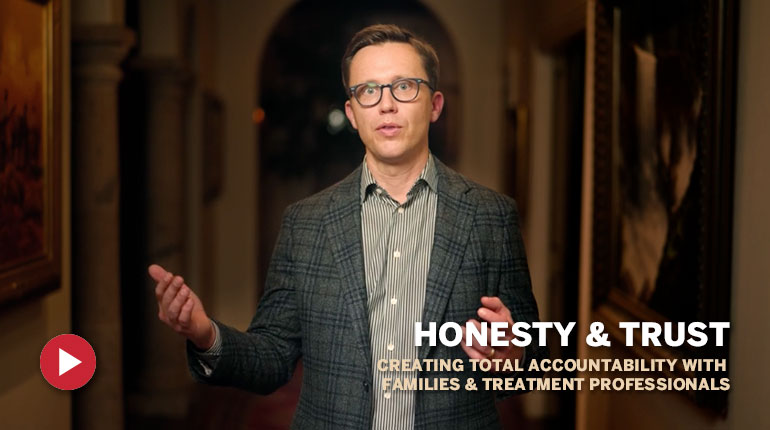The Importance of Honesty & Trust at Burning Tree Ranch: A Message from Our Leadership & Treatment Team
Video Summary:
This video features Brook McKenzie (Chief Operating Officer), Meghan Bohlman (Clinical Director), and Jesse Earwood (Executive Director) of Burning Tree Ranch discussing the critical role of honesty in our long-term addiction treatment program. They discuss the importance of both clients and their families practicing a rigorous kind of honesty throughout the treatment process.
Burning Tree Ranch places an emphasis on actions over words and encourages vulnerability with clients and their families. Families are asked to be completely transparent about their concerns, past experiences, and doubts.
A key part of treatment at the Ranch is the disruption of addicted individuals’ ability to manipulate situations, or to use ‘divide and conquer’ tactics against their family members and the clinical team.
At Burning Tree, we ask that families take a risk by trusting our team and allow us to guide both the client and the family towards a life of freedom from addiction.
Read: Video Transcript
[Video opens with Brook McKenzie, LCDC, Chief Operating Officer]
One of the main things we ask our families to do while their loved one’s participating in treatment at Burning Tree Ranch is to develop a deep, and effective relationship with honesty. At Burning Tree Ranch, while our client’s intentions are important, it’s their actions that really matter. We try to help our clients understand how to match their words with their actions and to rely more on their ability to be honest, to take risk, and to be vulnerable. This is an environment where risk-taking and honesty are of utmost importance.
[Scene changes to Meghan Bohlman, LPC, LCDC, & Clinical Director of Burning Tree Ranch]
When we ask families to be honest, we mean every inch of the word honesty. We are going to ask you that if something comes up in a phone call that you’re concerned about, that you tell us. When something feels off, we’re gonna ask that you say, “Hey, something feels off, I don’t know if I trust this.” We’re gonna ask that you be very honest about what transpired before you ever got to Burning Tree, however you might feel about it.
[Scene changes to Jesse Earwood, Executive Director]
We mean rigorously honest. That means that we’re gonna ask them to report things that they may think is going to get their loved one in trouble. We’re going to ask them to stop hiding secrets, because that’s really where alcoholism and drug addiction lives – it lives in the darkness, it loves in the shame and guilt and the remorse of the things that were done and, “What are people going to think if they find out about my family and our secrets?” So what we’re going to ask them to do is to be totally open with us and trust us enough to give us that stuff and let us help them with it
[Re-enter Meghan Bohlman]
It’s highly important that families trust the clinician that they’re assigned to. Clients do not like the fact that we have a relationship with them, and then we have a separate relationship with the family, and then we have a third with everyone together on the team. That really disrupts the divide and conquer narrative that they have. It really kind of exposes the racket that they’ve been running in order to further their addiction and alcoholism for as long as they have.
[Re-enter Jesse Earwood]
Clients can tell if their family doesn’t trust us. It’s an age old – every child does this, they split their parents, they get their way, and alcoholics and drug addicts are very keen on being able to divide and conquer. So they know if their families don’t trust us, and they act accordingly. And when a family does trust us, it supports us to help the client not have an option other than to take the actions necessary. Without trust, nothing really can change. Until a problem has been entirely faced, there’s not a lot of hope for that problem to be addressed in a real, meaningful way. So honesty is going to be a requirement if any substantial change is ever going to be possible. What I would ask the family to do is to take a risk with us and give us an opportunity to earn your trust, and give us an opportunity to really be the people in your life that are guiding you into a new era, into a new freedom.





